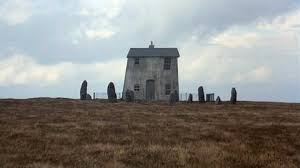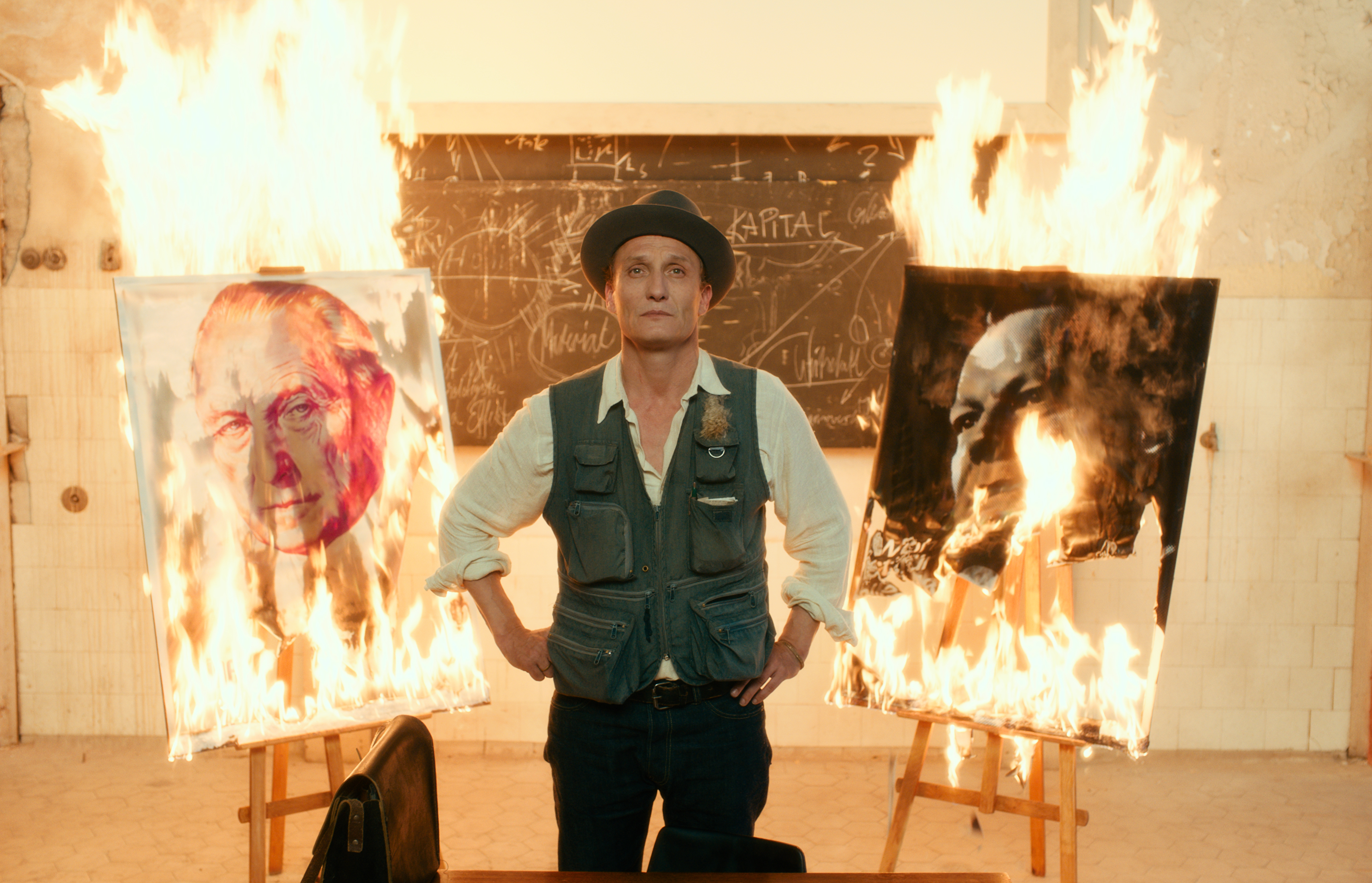Interview: '4 Days in France' Director Jérôme Reybaud on Grindr and the Sensuality of Syntax
 Friday, August 4, 2017 at 7:30PM
Friday, August 4, 2017 at 7:30PM By Jose Solís
 Courtesy of Cinema Guild
Courtesy of Cinema Guild
Jérôme Reybaud 4 Days in France (which I reviewed here) is a sensual travelogue that follows Pierre (Pascal Cervo) a privileged Parisian man who leaves his lover (Arthur Igual) behind to go on an aimless road trip into the French countryside accompanied only by Grindr and his desire. An evocative, funny, and quite sexy film, 4 Days in France is surprisingly Reybaud’s directorial debut, quite the feat given how secure he is in his choices, and how much he relies on elements - gay sex onscreen, older female characters, poetic dialogues - that would make other filmmakers run for the woods, no pun intended.
As the film opens in New York and select markets in the US, I spoke to Reybaud about his bold directorial choices, his fascination with online dating, and how he ended up casting a Tony nominated legend.
JÉRÔME REYBAUD: Yes! I don’t have Grindr or a cell phone myself, but I didn’t expect the Grindr ignorance I’ve seen with some Parisian or NY guys. I assumed a heterosexual couple in provincial France wouldn’t know it, so I added a little information about the app for people who wouldn’t know what it was.
[Read the rest of the interview after the jump]
JOSE: I love the contrast in the movie between nature and technology. We have these incredible moments when Pierre is trying to find reception to hook up with men while he’s missing out these gorgeous fields.
JÉRÔME REYBAUD: You saw that in the movie I show the ways of making connections, one is the traditional in person and the other through apps. I don’t judge either, the movie shows both ways. I don’t like using technology for that, but the beauty of Grindr is that it’s a tool to multiply chances. At least on paper the possibilities are immense, you can meet a stranger in the most unknown of places. I find that fascinating.
JOSE: This is your first film but it feels so tight and confident, as if you knew exactly what you wanted from the get-go. How did you accomplish this? Were you worried about the results?
JÉRÔME REYBAUD: It’s my first feature but I’m 47 years old, so it’s the first feature film by an old man (laughs). I’ve spent the time before reading, listening to music and watching films, in college I spent 7 years of my life reading, that gives you power, and more than anything I knew exactly what I didn’t want, 47 years have taught me what I definitely don’t like.
 Director Reybaud. Courtesy of Cinema Guild
Director Reybaud. Courtesy of Cinema Guild
JOSE: You mentioned how much time you spent reading, and I’ve always been fascinated by how much writing and reading dating apps involve. Even though the purpose might not be necessarily the same, Grindr messages make me think of letters in Jane Austen novels, and strangers exchanging words to figure out whether they want to seek something else or not.
JÉRÔME REYBAUD: I’d say the same thing, but actually one of the things I don’t like is that Grindr creates a wall or a veil between you and the person. When you meet in person there’s only the eyes and the desire, but online you only have words. A person’s syntax is the reality of the man, the most revealing thing about someone is the language. It seems stupid but I think some grammatical or spelling mistakes on Grindr made me want to give up on some of these men. The way someone talks is so important, you reveal a lot of yourself just by how you say “hi”, you’re revealing your background, your upbringing etc.
I just think it’s funny that centuries ago people got married after years of exchanging letters, and now we have instant dick pics.
Oh yeah, I love that. Going back to the topic of unknown people, the movie deals with how you can do so much more things with unknown people. You can reveal very intimate details to strangers.
We all become storytellers.
Absolutely, the space itself is like the theatrical stage, we have two people side by side talking. In the 17th century in France, actors in Moliere plays acted side by side, almost never looking at each other, like two people sitting in front of a car.
The film felt rather romantic even if many people don’t think of random sexual encounters as romances, but you also explore the connection between sexual desire and danger. We see Pierre checking his messages as he drives and can’t help but worry he’ll crash his car. But we also wonder if he’ll meet some psycho, or if he himself is a psycho. Can you comment on this dichotomy?
Sometimes people are surprised to see a connection between sex and romance, but for me they are the same thing. 15 minutes of romance can happen during 15 minutes of sex with a stranger. I’m glad you felt that sense of danger, because I thought I could’ve done even more. I wanted the film to have a sense where anything could happen. It’s my favorite thing as a viewer, I don’t want to know what’s coming up in the next shot. A woman told me that the film didn’t have a sense of danger, she was a driver, spent her life on the road and said my movie didn’t represent the danger of the road. If I had done a movie about that instead, it would’ve opened political discussions I didn’t want to have, but I did think of making that movie, perhaps one called “Nights of France”, in which I would present this danger which is in every corner.
The French title, Jours de France (Days of France) sounds like something Jean Renoir could’ve directed.
(Laughs) Thank you.
Did you have any input in the English title? I feel the French title is much more evocative, 4 Days in France doesn’t sound as sensual.
It was my choice (laughs) my producer called me to come up with an English title, as you can hear my English isn’t very good, so I just said “4 Days in France”. In French, Jours de France can mean many other things, I studied the poet Philippe Jaccottet who wrote a poem called “Journées” which I think is so beautiful. So I’m aware there is a poetry to the French title that isn’t in the English one.
 Courtesy of Cinema Guild
Courtesy of Cinema Guild
It’s OK, the lack of sensuality fits the puritanical way in which sex is treated like in America.
It’s strange, in France we are colonized, we watch American movies every day, so we feel close to American movies and culture, but I can also feel that gap. I was in San Francisco recently and thought I would feel that gap, we showed the movie at the Castro Cinema which was beautiful, and I didn’t feel it. The only thing was how many people were surprised to see my movie was almost completely funded by public money, it’s strange to me that this is not a possibility in America. I didn’t notice anything about sex in America, in Japan however they didn’t want to show the movie because of the young man’s ass.
That’s crazy! Japan gave us Oshima.
Yes, sex can be very violent in Japan. But I respect each culture, if the Japanese don’t want to see French asses I’m OK with that.
Even though apps like Grindr are a part of our lives we don’t see it onscreen often, maybe because it would be kinda boring to see movies of people looking at screens. What kind of challenge did this present you with?
You’re right, we see people on the phone and texting in every movie, so the difficulty isn’t figuring out how to shoot this. When we were shooting I was very anxious about the possibility of another movie doing the Grindr thing before mine came out, it took me 4 or 5 years to write the screenplay, so it took me a while to do this. One of the distributors met with Grindr publicity people to talk about this movie.
I also wondered if Pierre’s attachment to the arts, is something you put of yourself in him.
There are two reasons, his social background and his job as a university professor, but on another level, perhaps more interesting, sometimes when I ask for money to finance a movie the committees ask for more literate movies. I explained I didn’t want to include literature, music and theatre literally, but as part of the landscape of France. The most important literature of France is based on the landscapes, the mountains, Rimbaud traveled hundreds of kilometers and wrote his poems. This is also why all the music I use in the film is by French composers and musicians, it’s not about culture and literature in capital letters, but as part of nature.
 Courtesy of Cinema Guild
Courtesy of Cinema Guild
I’m dying to know how did Liliane Montevecchi end up in your movie!
I’m glad you like her, she is absolutely incredible. Every part of the movie was written with an actor in mind, so unlike most movies I had to adapt the script for the actor. I originally wrote her part for an actress called Judith Magre, she’s older than Liliane, she has a lot of energy and said she would do it. One week before shooting she was rehearsing for a play which she had to do all by herself, so she got anxious and told me she couldn’t do the film. I looked for replacements but it was impossible, my partner said Liliane Montevecchi was the only one who could take over. Judith and Liliane are the same kind of person, as humans they are very similar, except Judith did tragedies and Liliane did Broadway.
We knew Liliane lived in New York, so we Googled her and realized she was coming to sing in France for the first time in like 20 years, so I met with her, she didn’t know what to say because I’m completely unknown. She was drinking champagne in the afternoon and she said as a gamble she’d do it. I was so happy because she was the only person who could bring that sense of humor and depth to that character. I’m very happy we’re talking about her. When the film was selected as part of New Directors/New Films I was especially happy because it would be my way of showing her the film in New York. I didn’t want to send her a DVD or a link, I wanted her to see it on the big screen. Watching it with her at MoMA was kind of my private screening for her. I was so emotional.
4 Days in France is now in theaters.



Reader Comments (3)
Liliane Montevecchi!
Great interview. I feel like going out for drinks with you guys!
Lovely interview, yes! I can almost see and hear how Jérôme Reybaud enunciates the words as he speaks. And wow Liliane Montevecchi!
Great interview, I hope this movie opens in MTL!
(Must add, your little men/me typo in the 2nd question is pretty great.)